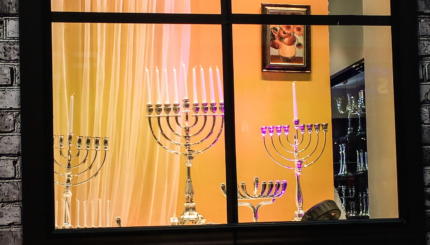When is Hanukkah 2015? Click here to find out!
Thanksgiving is coming, and Hanukkah is just around the corner. The holidays always remind me of both the rapid pace of change in our own lives – and the historical changes in how we observe certain times of the year.
Take Thanksgiving. The movie Sweet November has the line, “Happy-we-stole-your-land-and-killed-your-people-day!” And yet, most of us do not recite this at our Thanksgiving tables! In fact, I would imagine very few of us spend much time thinking about Pilgrims and Native Americans at all. Instead, Thanksgiving has become a day to spend with family and friends, eating too much, expressing gratitude and watching good football. We may see other ways that the holiday has changed as well in our own lives. Many of us have the experience of moving from the “kids’ table” to the “adults’ table” for the holidays. We also find ourselves taking note of who is present at our celebrations, especially if it is a year of loss in a family or of family additions.
It is not just our personal connections to holidays that change, but holidays themselves change throughout history. Thanksgiving celebrations began in the 16th century, taking place on different days in different colonies. It was during times of crisis that our country’s leadership emphasized the holiday; the first Thanksgiving Proclamations were issued during the Revolutionary War, and then again in 1863 when President Lincoln issued a Thanksgiving Proclamation mentioning the gravity of the Civil War. Dealing with the Great Depression, President Roosevelt moved Thanksgiving from the last to the fourth Thursday in November in order to lengthen the holiday shopping season! Depending on what was happening for the United States, different emphases emerged for the holiday.
READ: The Rabbis of Philadelphia and the Governor’s “Christian” Thanksgiving
This kind of change is not just an American phenomenon, but a Jewish one as well. Innovation and reformation have been the bedrocks of Judaism since its inception. Let’s take the next Jewish holiday: Hanukkah. Many of us associate that holiday with a small cruse of oil lasting eight days by some miracle of God (providing us the luxury of eating oily potato latkes and greasy jelly donuts!). While a generation of early rabbis chose to emphasize that version of the Hanukkah story, there are even earlier stories that make no mention of God or of oil.
READ: What You Need to Know About the Hanukkah Story
In the second Book of Maccabees, written closer to the actual events, Hanukkah is a story about Jewish national power, a fractured community, and a military struggle. The later rabbis who emphasized oil and a miracle of God chose to de-emphasize Jewish might because they feared the Jews would rebel against Rome. Much later, in Civil War America, the Hanukkah story was often told once again as one of national strength and survival. In other words, Jews of each generation did not see themselves as recipients of a holiday with just one story or theme associated; rather, they saw their opportunity to create their own meaningful experience.
This is one of the many things I love about Judaism – being authentic means creating our own connections, with a respect for tradition and with hope and creativity for the future. It does not mean merely repeating what our ancestors have done for generations before. Our role is not to be passive recipients, but rather creators.
So, as we sit at our Thanksgiving tables in less than two weeks, and our Hanukkah tables next month, let us remember that the celebration is not about one moment in history. We are free to change. Let’s figure out what it is about each holiday that matters to each of us – let’s celebrate that!
Hanukkah
Pronounced: KHAH-nuh-kah, also ha-new-KAH, an eight-day festival commemorating the Maccabees' victory over the Greeks and subsequent rededication of the temple. Falls in the Hebrew month of Kislev, which usually corresponds with December.



